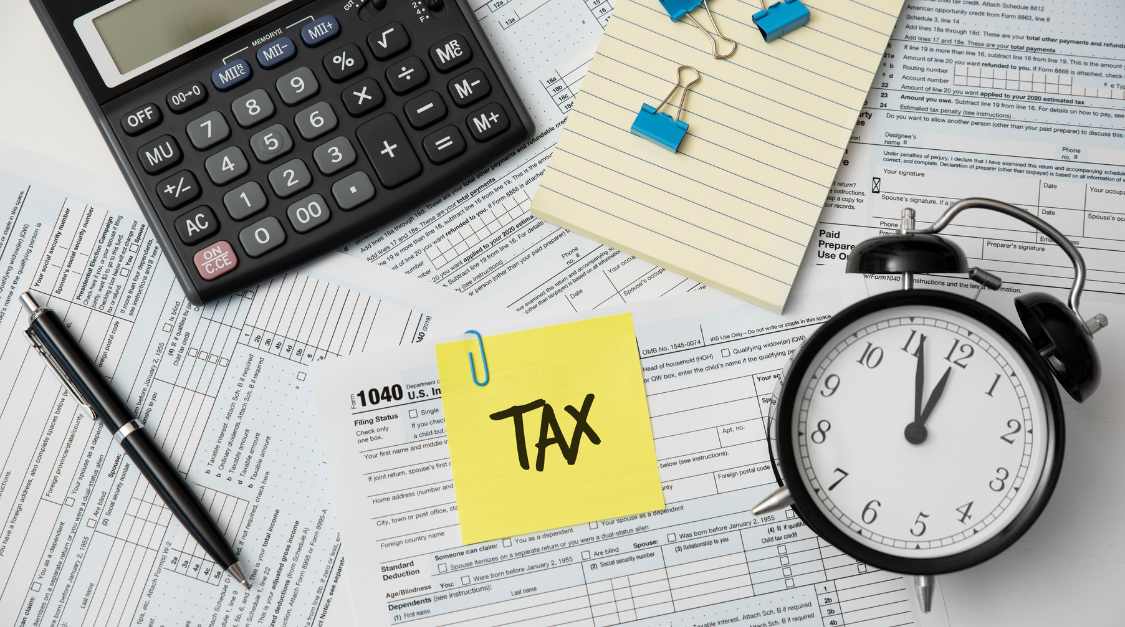It’s that time of the year again – tax season. As we prepare to file our annual tax returns, many of us are looking for ways to save on taxes and maximize our refunds.
While taxes may be a necessary part of life, there are legitimate ways to reduce the amount you owe or increase your refund.
In this blog post, we’ll share some savings tips and tricks to help you save on taxes this year and keep more money in your pocket. Let’s dive in!
Understanding How Taxes Work: Basics You Need to Know

Understanding how taxes work is essential for anyone looking to save on their tax bill. While it may seem daunting at first, it’s actually quite straightforward once you grasp the basics. So let’s break it down!
First, you need to understand your income. Taxes are typically calculated based on your taxable income, which includes your salary, wages, and any other sources of income. This is the amount you’ll use to determine your tax bracket and how much you owe.
Next, familiarize yourself with the different tax brackets. These are the income ranges that determine the percentage of your income that will be taxed.
The higher your income, the higher your tax rate. By understanding your tax bracket, you can start to strategize ways to lower your taxable income and potentially pay less in taxes.
Utilizing Tax Deductions: What Can Be Deducted and How
When it comes to saving on taxes, one of the most powerful tools in your arsenal is tax deductions. Deductions allow you to subtract certain expenses from your taxable income, reducing the amount of income that is subject to tax.
But what can be deducted, and how can you make the most of these deductions?
There are a wide range of expenses that can potentially be deducted on your tax return. Some common deductions include mortgage interest, state and local taxes, medical expenses, and certain business expenses.
It’s important to keep track of these expenses throughout the year so that you can take full advantage of them when tax season rolls around.
To ensure that you’re maximizing your deductions, it’s helpful to keep organized records and receipts. This will make it easier to identify and substantiate your deductible expenses.
Additionally, it’s a good idea to familiarize yourself with the specific rules and limitations for each deduction. For example, there are limits on how much mortgage interest you can deduct and certain medical expenses must exceed a certain threshold before they can be deducted.
When it comes to deductions, it’s also important to consider whether it makes more sense to take the standard deduction or to itemize your deductions. The standard deduction is a predetermined amount that you can subtract from your taxable income without having to itemize your expenses. However, if your itemized deductions exceed the standard deduction, it may be more beneficial to itemize.
Leveraging Tax Credits: Hidden Savings You Should Be Aware Of

Tax credits are another powerful tool that can help you save on your taxes. While deductions reduce your taxable income, tax credits directly reduce the amount of tax you owe. This means that if you’re eligible for a $1,000 tax credit, you’ll owe $1,000 less in taxes.
There are various tax credits available, and it’s important to be aware of them so you can take advantage of the savings. Some common tax credits include the Child Tax Credit, the Earned Income Tax Credit, and the Lifetime Learning Credit. Each credit has specific requirements and limitations, so it’s important to review the eligibility criteria.
For example, if you have children, the Child Tax Credit can provide a significant tax benefit. Depending on your income and the number of children you have, you could receive a credit of up to $2,000 per child. This credit can help offset the cost of raising a family and provide some much-needed financial relief.
The Earned Income Tax Credit is another valuable credit, especially for low to moderate-income individuals and families. It’s designed to provide assistance to those who are working but may not earn enough to meet their basic needs. The amount of the credit depends on your income and family size, and it can result in substantial savings.
The Lifetime Learning Credit is available to individuals who are pursuing higher education. Whether you’re taking a course to advance your career or simply exploring a new interest, this credit can help offset the cost of tuition and other educational expenses. It’s important to note that this credit has income limits and other restrictions, so be sure to review the details before claiming it.
By understanding the various tax credits available and their eligibility criteria, you can leverage them to maximize your savings.
Keep in mind that tax credits are not automatic – you’ll need to claim them on your tax return. Be sure to review the instructions and requirements carefully, or consider working with a tax professional who can help you navigate the process.
Tax-Efficient Investing: A Pathway to Lower Taxes
Investing is not just a way to grow your wealth; it can also be a smart strategy for lowering your taxes. By making tax-efficient investment decisions, you can minimize the amount of taxes you owe and potentially increase your overall return on investment. So how can you make your investments work harder for you come tax time?
One effective tax-efficient investing strategy is to focus on tax-advantaged accounts such as IRAs (Individual Retirement Accounts) and 401(k)s.
Contributions to these types of accounts are often tax-deductible, meaning you can reduce your taxable income for the year. Additionally, any earnings within these accounts can grow tax-deferred until you withdraw them in retirement.
By taking advantage of these accounts, you can lower your tax bill both now and in the future.
Another strategy is to be mindful of the types of investments you hold in taxable accounts. Investments such as stocks and bonds can generate taxable income in the form of dividends and interest.
However, by strategically choosing tax-efficient investments, such as low-cost index funds or tax-exempt municipal bonds, you can minimize the tax impact. These investments tend to have lower turnover and generate less taxable income, helping you keep more money in your pocket.
Tax-loss harvesting is yet another powerful tool in the tax-efficient investing arsenal. This strategy involves selling investments that have decreased in value to offset capital gains taxes on other investments. By strategically “harvesting” losses, you can lower your tax bill and potentially increase your overall after-tax returns.
It’s important to note that tax-efficient investing is not a one-size-fits-all approach. Your individual circumstances, risk tolerance, and investment goals will play a role in determining the best strategy for you.
Consulting with a financial advisor or tax professional can help you navigate the complexities and make informed decisions.
Strategically Planning Your Charitable Donations for Maximum Tax Benefits
When it comes to charitable donations, giving back feels good, but did you know it can also benefit you come tax time?
That’s right, strategically planning your charitable donations can maximize your tax benefits and help you save even more money. Here are a few tips to help you make the most of your charitable giving:
First, consider timing. Charitable donations made before the end of the year can be deducted on your tax return for that year. By making your donations in December, you can lower your taxable income and potentially increase your refund.
Keep in mind that you’ll need documentation of your donations, so be sure to ask for receipts or acknowledgment letters from the organizations you support.
Another strategy is to donate appreciated assets, such as stocks or real estate, instead of cash. When you donate these assets, you can generally deduct the fair market value on the date of the donation, without having to pay capital gains tax on the appreciation. This can be a great way to support your favorite causes and potentially save on taxes.
If you’re unsure of where to donate, consider supporting qualified charitable organizations that align with your values and passions. This way, you can feel good about where your money is going and potentially take advantage of additional tax benefits.
For example, if you donate to a qualifying organization that provides education scholarships, you may be eligible for the Lifetime Learning Credit we mentioned earlier.
Lastly, don’t forget about the small contributions. While larger donations can have a bigger impact on your taxes, even small charitable contributions can add up over time. Keep track of these donations and make sure to include them when you itemize your deductions.
Timing is Everything: Smart Strategies for Tax Deadlines
We all know that taxes come with deadlines, and missing those deadlines can result in penalties and fees. So it’s important to be aware of tax deadlines and plan accordingly.
But did you know that timing can also play a strategic role in maximizing your tax benefits? It’s true – timing is everything when it comes to smart strategies for tax deadlines.
One key strategy is to file your taxes as early as possible. By getting ahead of the game and filing early, you can potentially avoid the last-minute rush and reduce the chance of making errors. Plus, if you’re due a refund, you’ll get it sooner rather than later. So why wait? Take control of your tax situation and file your taxes early.
Another important deadline to keep in mind is the deadline for contributing to tax-advantaged accounts, such as IRAs and 401(k)s. For example, if you want to make a contribution for the previous tax year, you generally have until the tax filing deadline to do so.
By taking advantage of this opportunity, you can lower your taxable income and potentially increase your retirement savings. So mark your calendar and make sure to contribute before the deadline.
Lastly, don’t forget about the importance of estimated tax payments. If you’re self-employed or have income that isn’t subject to withholding, you may need to make estimated tax payments throughout the year. By making these payments on time, you can avoid penalties and stay on track with your tax obligations.
Working with a Tax Professional: Is It Worth It?

If you’re feeling overwhelmed by the complexity of the tax system or unsure about how to maximize your savings, working with a tax professional may be worth considering. While it may involve some additional costs, the benefits can often outweigh the expense.
One of the biggest advantages of working with a tax professional is their expertise and knowledge of the tax code. They stay up-to-date with the latest tax laws and regulations, ensuring that you take advantage of all available deductions and credits.
They can also help you navigate any complex tax situations, such as self-employment or investment income, and provide personalized advice based on your specific circumstances.
A tax professional can also save you time and reduce stress. Instead of spending hours trying to decipher tax forms and figuring out which deductions to take, you can hand off the task to someone who knows the process inside and out. They can handle the paperwork, answer your questions, and help you meet all the necessary deadlines.
Furthermore, working with a tax professional can provide you with peace of mind. They can review your tax return for accuracy, reducing the risk of errors or audit triggers. If you do get audited, they can guide you through the process and represent you before the IRS.
In my personal experience, working with a tax professional has been a game-changer. Not only did I save more on my taxes than I ever could have on my own, but I also gained valuable knowledge and insights that I can apply in future tax seasons. Plus, the stress relief alone was worth every penny.
